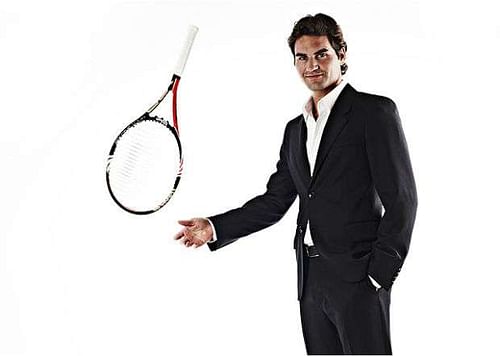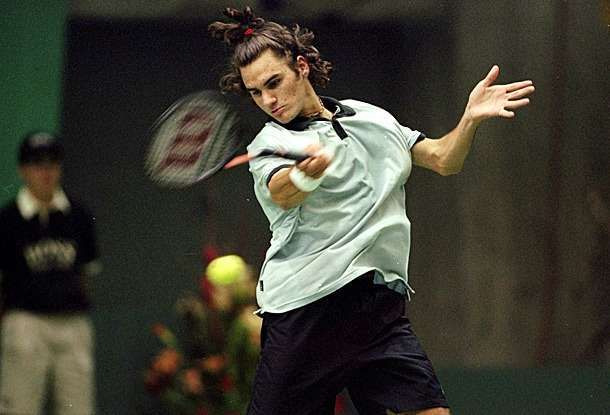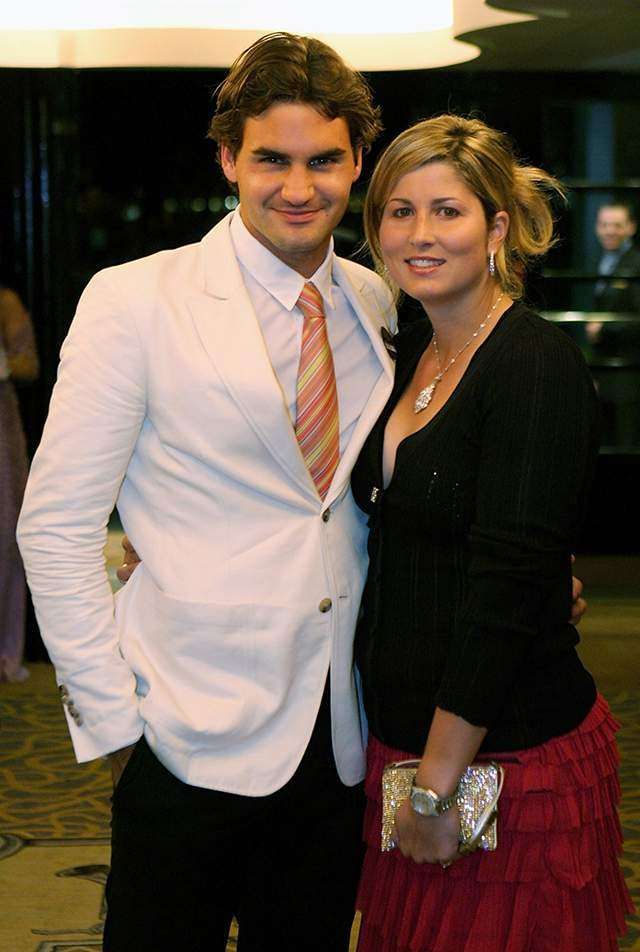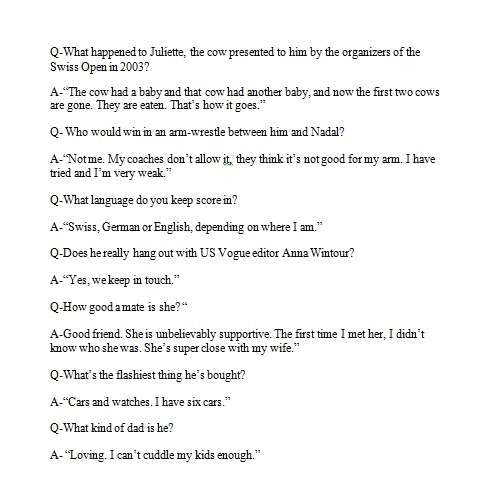
What makes Roger Federer great?
William Shakespeare once said, “Be not afraid of greatness. Some are born great, some achieve greatness, and others have greatness thrust upon them.”
After total dominance of the men’s circuit over the past decade and a half, it wouldn’t surprise many if Roger Federer decided to sit back and enjoy life with his family, watching mere mortals in action from the stands. But at 35 Mr. Federer is hell bent upon chasing and conquering a goal which no one associated with tennis has ever heard of.
People might have various explanations as to how he has achieved such greatness with such ease. Grace, class, humility.
For athletes like Federer, who come about once in a million years, time freezes as they go about their craft with precision and panache. In simple words, winning never gets old for the Swiss. Which brings us to the big question: “How does he do it?”
In an interview with The Guardian’s Simon Hattenstone, Federer spoke about the secret behind longevity, his growth from a moody youngster to a mature adult and much more.
This year Federer has had more time on his hands than he had expected, after pulling out of the French Open with a back injury. He’s been using the opportunity to launch a new clothing line and to spend quality time with his children while squeezing in time for such interviews.
Even today, after 15 years of vast success, Federer looks at his racquet the same way a child sees his favourite toy.
Attitude change
The young Federer was an outrageously talented sportsman at football as well as tennis, but he was almost undone by his attitude. He was known for his fiery temper and smashing of racquets more than his playing style.
Federer recollects: “I wasn’t the angry type, I was always the sad and disappointed type.”
“I’d throw the racket tactically, into the nets, so it wouldn’t break and I wouldn’t have to go to my parents because it’s a lot of money. I’d commentate on each shot, saying, how in the world could I miss that, I can’t believe how badly you’re playing.”
“My parents would get so disappointed in me and upset, they would just walk away.”
Federer won junior Wimbledon at 16, but then his emotions kept getting the better of him. Other players realized he had a fatal flaw.
“People knew, eventually, he’ll crack,” he said, describing what many others said of him. “Just stay with him and he’ll give you some easy mistakes. So I tried to create this aura of invincibility, of being tough to beat.”
Federer’s heroes came from a later generation and were the fiery types such as Goran Ivanisevic. When coaches asked him to quieten down, he agreed, but only up to a point. He had to get his emotion out. Eventually, he found the balance.
That was probably the defining moment of his career. Federer says, “I said, I need to find a balance. I can’t just be ice, it becomes horribly boring. I need the fire, the excitement, the passion, the whole rollercoaster. But I need it at a level where I can handle it: if I’m all fire, I go nuts. It took two years to figure that out. It was a long road.”
When asked if he would be the same champion he is today with the brash attitude Federer chuckled and replied with diplomacy. He is happy with himself for turning it around and becoming a mature adult and a calm man, but feels he had enough in his bag of talent to win titles while also being a little ‘cuckoo’.
Over the years, Federer has played in 65 successive Slams – a testament to his fitness and desire to win. And then there are countless records to his name which make him arguably the greatest men’s tennis player of all time. With 17 Majors to his name, he has at least 3 Slams more than any of his challengers.
Federer will be 35 in August. Most players his age are long retired, but the Swiss is still ranked No. 3 in the world and believes he can win another Wimbledon.
Much has been written about Federer's style of play and how watching him in action is a “religious experience”. The reason behind all the adulation the man receives from men, women and children alike is probably the way he carries himself on and off the court.
Personal life
Federer never lets go of an opportunity to talk fondly about his wife, Mirka Vavrinec. The pair met at the Sydney Olympics in 2000, where they were both competing. She was 21, he was a young 18. Mirka and Roger’s personalities were like chalk and cheese. He was gifted and even a little wild, but she was very different: tough, disciplined, ascetic.
“She’s always been older than me,” Federer said. “When I kissed her for the first time, she said, ‘You’re so young.’ I said, ‘Well, I’m almost 18 and a half.’ You know how you try to shove another half year in? And she was like, ‘OK, you’re a baby.’”
Mirka has played a huge part in Federer’s success. Look at the facts, he says.
“When I met her I had zero titles, today I have 88, so she’s been on this ride for the whole time.” The way he talks of her with tender pride, you can sense she was his role model.
“She used to train five, six hours in a row. Her parents had to work extremely hard. She was tough, and she taught me how to work. I would be at the tennis centre and see her do six-hour sessions, and I’d think, I can’t do that. I’d check out mentally after an hour and go, this is so boring. So I’d get kicked out of practice for bad behaviour.”
It is a given rule that natural talent gets you only so far: it takes elite performers 10,000 hours’ practice to fulfill their potential. It annoys Federer when people call him an exception to that very rule.
He was always putting in the hours; just not necessarily in the right order and at the right time. Only when he put in Mirka-style stints did he start to fulfill his potential.
In 2001, Federer made headlines by reaching the quarterfinals at Wimbledon and Roland Garros, but the following year he was knocked out of both in the first round. The press believed he had psychological issues and that his talent was fading. It was Mirka and his parents who supported him through these tough times.
In 2003, he finally broke through, beating Mark Philippoussis in the Wimbledon final in straight sets, and over the next six years established himself as the greatest.
On his achievements
10 consecutive Grand Slam finals, 23 consecutive semifinals, 36 consecutive quarterfinals. He has spent 302 weeks as the No. 1 ranked player in the world, 237 consecutively. He is the only player to have won two Grand Slams five times consecutively – Wimbledon (2003-2007) and the US Open (2004-2008)
When asked which of his achievements was the most memorable, he singles out three:
– the first time he beat Sampras, in 2001, because that put down a marker;
– His first Wimbledon win (“I’d achieved my dream and my career could stop right then because all I’d ever wanted to be was a Wimbledon champ”);
– And his 2009 French Open victory against Robin Soderling. “That was the one Slam I thought, maybe I’m never going to win it. When I did, I was so happy. Plus relief.”
The emotional side of Federer
Since his first Wimbledon triumph, Federer has maintained a calm persona on court. Very rarely have we seen him getting angry or pumped up, but emotions have gotten the better of the great man on a few occasions. The first time was when he was playing for Switzerland in the Davis Cup win against the US in 2001.
Federer relives the moment by saying, “We beat the Americans in Basel, in my home city, where I used to be a ball boy. When I finally won the match I was so exhausted and happy, I broke down crying. And I was like, what is this emotion? I didn’t realize I had it in me.”
A few months later he had beaten Sampras in the fourth round at Wimbledon. He fondly remembers: “I saved a break point and ended up winning 7-5 in the fifth with the forehand down the line winner, got to my knees, broke down again. I’m like, are you crazy? What is wrong with you?”
He famously broke down after losing another epic against Nadal – the Australian Open in 2009. This time, he was ashamed.
“After losing a final, your head’s spinning and you just have to get through it, then you cry after you’ve walked out. But then the timing was horrible. This was Rafa’s moment and I took it away from him.”
But does all of this worry the man? He said with a smile, “No. I guess it’s one of the reasons I still play today, to relive those emotions.”
On talks of retirement
It’s been four years since Federer last won a Grand Slam. Unsurprisingly, there are endless rumours about his impending retirement, but he insists he has no plans. “I don’t want to say I’m enjoying it more, but it’s different. I have a deeper love for the game today. Before it was chasing the dream. Today it is living the dream and appreciating I can still do it. It’s a wonderful feeling.”
Finally, the great man revealed what keeps him going even at this age
“I’ve heard retirement [talk] since 2009 when I won the French and people were like, well, what else are you playing for? I’m like, what’s wrong with you people? Don’t you understand that playing tennis is great fun? I don’t need to win three slams a year to be content. If the body doesn’t want to do it, if the mind doesn’t want to do it, if my wife doesn’t want me to do it, if my kids don’t like it, I’ll stop tomorrow. Zero problems. But I love tennis in such a big way that I don’t care if I don’t win so much anymore. For me that is irrelevant.”
If there’s one tournament he’d like to win again, what would it be? “Wimbledon,” he said instantly. “This is where my heroes – Becker, Edberg, Sampras – won, I won the juniors there in 1998, my first slam, I won all these unbelievable matches there. Wimbledon is the holy grail.”
Yes Roger, there’s nothing we’d like more than to watch you set Wimbledon alight again with those trademark backhands and precise forehand approaches. Like a wise man once said, “No one knows the vagaries of Wimbledon grass better than Roger Federer”.
Let’s go, Roger, let’s go! #BEL18VE.



